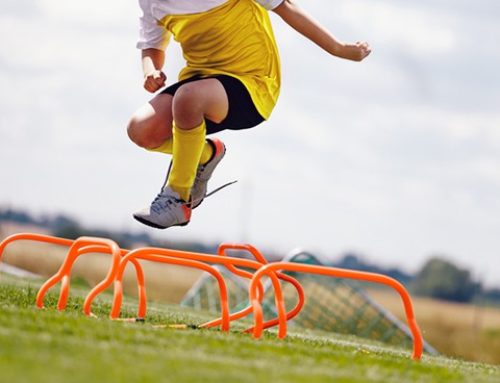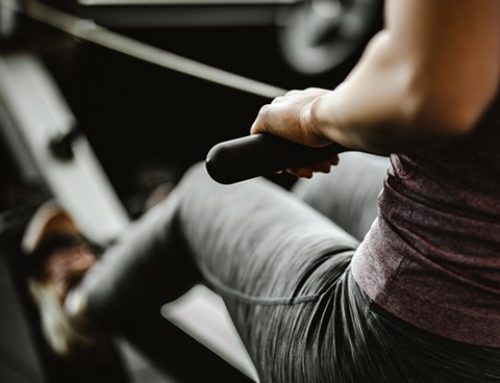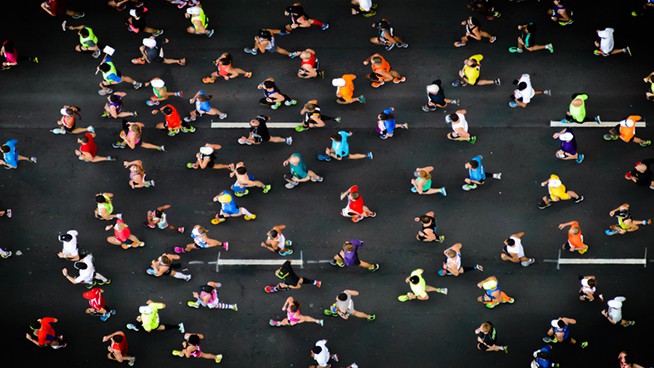Interview With Kara Goucher
Kara Goucher knows what it takes to go long and stay strong. Her third-place finishes in the 2008 New York City Marathon and the 2009 Boston Marathon proved she can compete against the world’s elite runners. But don’t be fooled by what seemed like an effortless transition from her Olympic distances of 5,000 and 10,000 meters. “Changing to the marathon was scary,” Kara says. “It was a really daunting task”—one that was overseen by world-class coach and National Distance Running Hall of Famer Alberto Salazar.
Stepping foot on the starting line at world-class races has been a long time coming for Kara, who initially got involved with the sport in junior high. After high school, she joined an elite program, choosing to run with the Buffaloes at Colorado, where she booked blazing marks, including seven-time All-American honors; the 2000 NCAA cross country crown; and 3,000 and 5,000 meter national outdoor titles.
Kara’s outstanding performances drew the attention of Nike, which offered her a contract. This relationship led Kara and her husband, Adam, to Portland, Ore., to participate in Nike’s revolutionary Oregon Project—a training approach that seeks to revamp American distance running at the international level. Though she was plagued with injuries prior to and following the transition, Kara got her health back on track in time for the Olympic Trials, where she won the 5,000 meters and placed second behind 10,000 meter champ Shalane Flanagan, securing a spot in Beijing. Kara didn’t garner any medals—she finished ninth and 10th place, respectively—but she ran away with invaluable experience. She is now planning to go the distance in 2012 at the London Olympics, where she has set her sights on winning the marathon.
Catching up with Kara fresh off of her third-place finish at the 2009 Boston Marathon, we found out how she’s keeping her health on track, maintaining motivation and elevating her training.
STACK: What was it like to increase your race distance so significantly?
Kara Goucher: You run a good 10k and people say, “Well, when are you going to run the marathon?” and they’re totally different [races]. One’s 20 miles longer than the other, so I was very nervous about running the marathon. My first marathon in New York I was very, very nervous. I ended up fading quite a bit, but I still loved it. I knew I had found the right event.
STACK: How did your training evolve?
KG: I don’t cross-train as much any more, but I run more miles. When I was getting ready for the Olympics, and I was running the 5k and the 10k, I would max out at maybe 90 miles a week, and that includes cross-training. Now, for the marathon, I’m running 20, 25 miles more per week. It’s just being able to handle longer runs and mentally wrapping my head around being out there for so long. My long run before was 16 miles; now it’s 23 miles, so just adjusting and taking the time and getting ready for being out there for hours.
STACK: You mentioned you don’t cross-train. What do you do to keep your body strong?
KG: I do a lot of weight lifting. I do a lot of general strength drills. I do Pilates. I have a Pilates session twice a week. I work with a personal trainer who helps me with my weaknesses, so we do a lot of lunges and things like that. I also have a routine. It’s called dynamic flexibility, and it’s just a stretching routine that I do. It’s moving as you’re doing it, so it’s not static stretching, and that has really helped me stay healthy and stay loose.
STACK: You’ve been injury prone in the past. How did you deal with injuries from a mental standpoint?
KG: I was injured a lot. I just always tried to keep my eye on the bigger things in life and keep perspective. As much as I would miss running, and I would get frustrated, it is just running, and you will heal and you will be able to come back. When I got really injured, and I couldn’t run at all, I would try to explore other things of my life. I went out and bought a cookbook, and I learned how to cook. As soon as I was healthy, I’d go back to running. I try to take advantage of the time to just discover more about myself.
STACK: In terms of training, what do you do to now to minimize the risk for injury?
KG: All the weightlifting, even the Pilates, staying flexible and staying strong. Being a better all-around athlete than I was before, that’s prevented a lot of injuries. I also get massaged two or three times a week, and I see a chiropractor and do a lot of preventative stuff. I have a standing chiropractic appointment where I go in and have active release therapy; and I have it every single Tuesday night no matter how good I feel. Once something starts to hurt, you have a problem. That doesn’t mean you can’t get over it quickly. But you already have a problem, so if I stay on top of it—and I see people all the time, even when I feel good—it just prevents anything from coming up.
STACK: Speak about the importance and value of rest and recovery for your body.
KG: Rest is so important, and I think that’s a component of my training [that] has allowed me to go to the next level. I never really took napping seriously. I never really took in nutrients as I was working out, and since I really started committing to that, I’ve been able to take my training to a whole new level. Sleep is really important. I’m in a position where I’m able to take a nap every day if I want to. I know most people can’t do that, but it has made a huge difference for me. Also, finishing a hard workout and getting a protein shake in my body within 15 minutes has made a huge difference. If I can jump in a pool after a hard session, aqua jog for 10 to 15 minutes, that makes a difference, too. Your body recovers so much better, and then you’re able to get more out of that workout, and you’re able to come back sooner after that workout with another hard one.
STACK: Tell us your pre-race routine. In terms of nutrition, what do you eat before a race?
KG: It depends on when I race. A lot of times when I race track, I race at 10 or 11 o’clock at night. For the marathon, I race at 9:30 in the morning. Before the Boston Marathon, I had half a bagel with cream cheese and a PowerBar. If I was racing at night, then I would wake up and have a normal breakfast, and have a really big lunch. I’d have a snack around 7 p.m., and then race at night. It’s important for me to not feel hungry. If I go to the starting line and I feel hungry, it’s not going to be good.
STACK: Why is hydration essential for runners, and has your performance ever been affected by not staying properly hydrated?
KG: Hydration is huge, and in high school that’s one thing that I didn’t do. I never really hydrated. I think it cost me a lot. I would tire out at the end of races, and races would just take so much more out of me. I hydrated really well a couple years ago when the World Championships were in Osaka, Japan. It was extremely hot and humid, and I think that was an advantage I had over other people. I had just really committed to hydrating. It makes you feel better, and it makes you recover better. It allows your muscles to recuperate and work better, and that’s just a huge thing.
STACK: What do you hydrate with now?
KG: Water and Powerade. That’s it. It’s just making sure I get enough.
STACK: You love running because you’re ultra competitive. What other distance runners do you look up to?
KG: I look up to a lot of runners that I compete against. Paula Radcliffe is probably the person I compete against now that I look up to the most. I just think she’s broken down so many barriers and she’s taken women’s marathoning, and even women’s distance running in general, to a whole new level. Shalane Flanagan and Jen Rhines—I just think they’re great, and I look forward to racing them because I feel like it raises my game.
STACK: How has Adam been a source of motivation in your life?
KG: People always want to know who inspires me, and Adam’s probably the biggest person, for everything he’s accomplished and everything he’s done. He’s had some setbacks the past couple of years, but he’s so tenacious—and really the start of the whole turnaround for American distance running. He’s just inspired me so much; he’s been there for me through thick and thin, and he motivated me when it seemed like things were so far away. He told me to keep believing, and he just kept me going through so many things. It’s really paying off.
STACK: Looking ahead, what’s next for you?
KG: My ultimate goal is to win the Olympic marathon in 2012. Second would be to win a major marathon here on home soil in New York, Boston or Chicago. Right now, my husband and I have a lot to sort through, and we’re figuring out when the next race will be. The ultimate goal is the Olympics and everything is secondary to that.
Photo: Getty
RECOMMENDED FOR YOU
MOST POPULAR
Interview With Kara Goucher
Kara Goucher knows what it takes to go long and stay strong. Her third-place finishes in the 2008 New York City Marathon and the 2009 Boston Marathon proved she can compete against the world’s elite runners. But don’t be fooled by what seemed like an effortless transition from her Olympic distances of 5,000 and 10,000 meters. “Changing to the marathon was scary,” Kara says. “It was a really daunting task”—one that was overseen by world-class coach and National Distance Running Hall of Famer Alberto Salazar.
Stepping foot on the starting line at world-class races has been a long time coming for Kara, who initially got involved with the sport in junior high. After high school, she joined an elite program, choosing to run with the Buffaloes at Colorado, where she booked blazing marks, including seven-time All-American honors; the 2000 NCAA cross country crown; and 3,000 and 5,000 meter national outdoor titles.
Kara’s outstanding performances drew the attention of Nike, which offered her a contract. This relationship led Kara and her husband, Adam, to Portland, Ore., to participate in Nike’s revolutionary Oregon Project—a training approach that seeks to revamp American distance running at the international level. Though she was plagued with injuries prior to and following the transition, Kara got her health back on track in time for the Olympic Trials, where she won the 5,000 meters and placed second behind 10,000 meter champ Shalane Flanagan, securing a spot in Beijing. Kara didn’t garner any medals—she finished ninth and 10th place, respectively—but she ran away with invaluable experience. She is now planning to go the distance in 2012 at the London Olympics, where she has set her sights on winning the marathon.
Catching up with Kara fresh off of her third-place finish at the 2009 Boston Marathon, we found out how she’s keeping her health on track, maintaining motivation and elevating her training.
STACK: What was it like to increase your race distance so significantly?
Kara Goucher: You run a good 10k and people say, “Well, when are you going to run the marathon?” and they’re totally different [races]. One’s 20 miles longer than the other, so I was very nervous about running the marathon. My first marathon in New York I was very, very nervous. I ended up fading quite a bit, but I still loved it. I knew I had found the right event.
STACK: How did your training evolve?
KG: I don’t cross-train as much any more, but I run more miles. When I was getting ready for the Olympics, and I was running the 5k and the 10k, I would max out at maybe 90 miles a week, and that includes cross-training. Now, for the marathon, I’m running 20, 25 miles more per week. It’s just being able to handle longer runs and mentally wrapping my head around being out there for so long. My long run before was 16 miles; now it’s 23 miles, so just adjusting and taking the time and getting ready for being out there for hours.
STACK: You mentioned you don’t cross-train. What do you do to keep your body strong?
KG: I do a lot of weight lifting. I do a lot of general strength drills. I do Pilates. I have a Pilates session twice a week. I work with a personal trainer who helps me with my weaknesses, so we do a lot of lunges and things like that. I also have a routine. It’s called dynamic flexibility, and it’s just a stretching routine that I do. It’s moving as you’re doing it, so it’s not static stretching, and that has really helped me stay healthy and stay loose.
STACK: You’ve been injury prone in the past. How did you deal with injuries from a mental standpoint?
KG: I was injured a lot. I just always tried to keep my eye on the bigger things in life and keep perspective. As much as I would miss running, and I would get frustrated, it is just running, and you will heal and you will be able to come back. When I got really injured, and I couldn’t run at all, I would try to explore other things of my life. I went out and bought a cookbook, and I learned how to cook. As soon as I was healthy, I’d go back to running. I try to take advantage of the time to just discover more about myself.
STACK: In terms of training, what do you do to now to minimize the risk for injury?
KG: All the weightlifting, even the Pilates, staying flexible and staying strong. Being a better all-around athlete than I was before, that’s prevented a lot of injuries. I also get massaged two or three times a week, and I see a chiropractor and do a lot of preventative stuff. I have a standing chiropractic appointment where I go in and have active release therapy; and I have it every single Tuesday night no matter how good I feel. Once something starts to hurt, you have a problem. That doesn’t mean you can’t get over it quickly. But you already have a problem, so if I stay on top of it—and I see people all the time, even when I feel good—it just prevents anything from coming up.
STACK: Speak about the importance and value of rest and recovery for your body.
KG: Rest is so important, and I think that’s a component of my training [that] has allowed me to go to the next level. I never really took napping seriously. I never really took in nutrients as I was working out, and since I really started committing to that, I’ve been able to take my training to a whole new level. Sleep is really important. I’m in a position where I’m able to take a nap every day if I want to. I know most people can’t do that, but it has made a huge difference for me. Also, finishing a hard workout and getting a protein shake in my body within 15 minutes has made a huge difference. If I can jump in a pool after a hard session, aqua jog for 10 to 15 minutes, that makes a difference, too. Your body recovers so much better, and then you’re able to get more out of that workout, and you’re able to come back sooner after that workout with another hard one.
STACK: Tell us your pre-race routine. In terms of nutrition, what do you eat before a race?
KG: It depends on when I race. A lot of times when I race track, I race at 10 or 11 o’clock at night. For the marathon, I race at 9:30 in the morning. Before the Boston Marathon, I had half a bagel with cream cheese and a PowerBar. If I was racing at night, then I would wake up and have a normal breakfast, and have a really big lunch. I’d have a snack around 7 p.m., and then race at night. It’s important for me to not feel hungry. If I go to the starting line and I feel hungry, it’s not going to be good.
STACK: Why is hydration essential for runners, and has your performance ever been affected by not staying properly hydrated?
KG: Hydration is huge, and in high school that’s one thing that I didn’t do. I never really hydrated. I think it cost me a lot. I would tire out at the end of races, and races would just take so much more out of me. I hydrated really well a couple years ago when the World Championships were in Osaka, Japan. It was extremely hot and humid, and I think that was an advantage I had over other people. I had just really committed to hydrating. It makes you feel better, and it makes you recover better. It allows your muscles to recuperate and work better, and that’s just a huge thing.
STACK: What do you hydrate with now?
KG: Water and Powerade. That’s it. It’s just making sure I get enough.
STACK: You love running because you’re ultra competitive. What other distance runners do you look up to?
KG: I look up to a lot of runners that I compete against. Paula Radcliffe is probably the person I compete against now that I look up to the most. I just think she’s broken down so many barriers and she’s taken women’s marathoning, and even women’s distance running in general, to a whole new level. Shalane Flanagan and Jen Rhines—I just think they’re great, and I look forward to racing them because I feel like it raises my game.
STACK: How has Adam been a source of motivation in your life?
KG: People always want to know who inspires me, and Adam’s probably the biggest person, for everything he’s accomplished and everything he’s done. He’s had some setbacks the past couple of years, but he’s so tenacious—and really the start of the whole turnaround for American distance running. He’s just inspired me so much; he’s been there for me through thick and thin, and he motivated me when it seemed like things were so far away. He told me to keep believing, and he just kept me going through so many things. It’s really paying off.
STACK: Looking ahead, what’s next for you?
KG: My ultimate goal is to win the Olympic marathon in 2012. Second would be to win a major marathon here on home soil in New York, Boston or Chicago. Right now, my husband and I have a lot to sort through, and we’re figuring out when the next race will be. The ultimate goal is the Olympics and everything is secondary to that.
Photo: Getty












